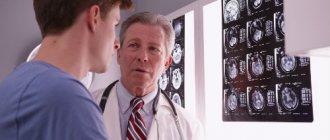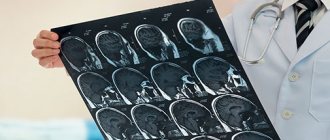Dizziness. A condition in which a person feels as if the objects around him and/or his own body are moving or rotating in a certain direction (systemic vertigo). But often a person cannot say exactly in which direction he and everything around him are moving (unsystematic dizziness). It happens that a person only notices his instability and the instability (staggering, trembling) of the space around him, a feeling of throwing back his head, moving his legs and torso in one direction (usually upwards), and his head in the other (usually downwards when lying on his back), a feeling falling into the abyss. Dizziness occurs when there is inconsistency between the organs of vision and the central nervous system, which is responsible for the sense of body position in space (kinesthetic) and the sense of balance (vestibular).
Symptoms and course
There are many causes of dizziness. Dizziness can also occur in absolutely healthy people, for example, when looking down from a great height or when looking at clouds, if you stand near a high-rise building - then you get the feeling that it is not the clouds that are moving, but the building is tilting. Dizziness occurs if you spin around your axis for a long time and then stop.
Dizziness as a manifestation of the disease can be caused by a disease of the inner ear, when the vestibular (equilibrium) apparatus is affected by an inflammatory or tumor process. Such patients usually suffer from inflammation of the inner ear (otitis) for a long time; first, their hearing decreases, and then dizziness appears. With tumor damage, attacks occur against the background of hearing loss, ringing in the ear, and attacks of dizziness gradually become more frequent and intensify.
Dizziness is very common when turning the head sharply to the side, when getting out of bed in the morning, tilting the head back (while wallpapering, hanging laundry, removing a book from the top shelf), when tilting the head to the side or forward for a long time (weeding, car repairs, long sleeping on a train or bus), sometimes “throws to the side” when walking. Such dizziness is caused by spasm or compression of the vertebral artery, which supplies blood to the parts of the brain responsible for balance. Dizziness can occur with high or low blood pressure, poisoning, loss of fluid (vomiting, diarrhea) or blood loss (bleeding). Dizziness is also accompanied by anemia (lack of red blood cells in the blood) and high fever.
Recognizing dizziness is not difficult, it is based on the patient’s complaints, symptoms characteristic of dizziness treatment (drunk gait, the patient’s attempts to grab surrounding objects, inability to stand or sit, frequent rhythmic twitching of the eyes (when looking to the side or up).
Summing up
Severe morning dizziness can occur due to basic oxygen deprivation of the brain. It occurs due to a sharp drain of blood from the main areas of the brain. Also the basis is various changes in the general well-being of a person or more serious illnesses.
For this reason, consultation with a specialist and treatment are so important. Features of qualified treatment depend on the causes of the condition. It may only take one competent procedure performed by an experienced doctor.
Regardless of what causes dizziness, there is no need to fear serious complications and consequences. The problem completely goes away after completing a course of a gymnastic complex aimed at improving the functioning of the vestibular apparatus.
[morkovin_vg video=»9IxpnoXeDfw, Causes of dizziness and treatment;bWua7Rqmpf0, Dizziness;ta5WmehEEA8;gtteMAZIOf4"]
If the condition and pathology are advanced, professional treatment will be required under the mandatory supervision of a doctor. Don’t panic, but immediately visit a professional who will prescribe competent and appropriately effective treatment.
Treatment and first aid
If dizziness occurs, place the patient on his back so that his head, neck and shoulders lie on a pillow, because in this position, kinking of the vertebral arteries is eliminated. You should avoid turning your head to the side, you need to open the windows, ventilate the room, put a cold bandage on your forehead, you can slightly moisten it with vinegar. Having measured the pressure and temperature, take measures to normalize them; if the heart rate is more than 100 beats per minute or an irregular heartbeat appears, and if dizziness is accompanied by nausea and repeated (more than 3 times) vomiting, you must call an ambulance. The prognosis depends on the nature of the dizziness.
Hypotension with VSD: how to treat nausea and dizziness in the morning
Dizziness and nausea with vegetative-vascular dystonia are associated with a sharp decrease in blood pressure. This is explained by the inadequate regulation of peripheral vascular tone, as well as venous insufficiency, which often accompanies VSD. It is difficult for a person with low blood pressure to maintain vigor and good health during the day; he has a particularly difficult time with hunger and thirst, is irritable, and inattentive. It takes a lot of effort for a hypotensive person to wake up in the morning and get out of bed. Our recommendations will help facilitate this process and improve your overall condition.
- Morning coffee is the most popular way to slightly increase blood pressure during hypotension. For people with VSD with frequent dizziness and weakness, doctors recommend two to three cups of coffee a day. If you don't have access to coffee, take one caffeine tablet. For arrhythmias and heart failure, which can also be accompanied by low blood pressure, coffee and products containing caffeine are contraindicated.
- Pouring your feet with cold water. You can tone up with a cold shower below your knees. A cold shower in your legs will help your veins contract and return more blood to your upper body, meaning you won't feel dizzy from low blood pressure. It's a pity that this simple method cannot help maintain normal blood pressure all day long. To reduce the likelihood of dizziness during the day with dystonia, regular cool foot baths in the morning and before bedtime are recommended.
- Gymnastics in bed. If morning exercises make you want to lie down as soon as possible, then exercises while lying in bed are what you need. Orthostatic collapse with VSD most often occurs immediately after waking up, when a person tries to jump up at the alarm clock. Several exercises in a lying position will activate blood circulation and restore muscle tone to the vessels of the legs. No tricks: lying on your back, stretch your arms and legs in opposite directions as hard as you can, rotate your feet, do the “bicycle” exercise for 30 seconds, roll over onto your stomach and bend your back, clasp your ankles with your hands and rock back and forth for 30 seconds, stretch forward first one hand, then the other. After this, sit on the bed and stay in this position for about a minute.
- Freshly squeezed orange juice immediately after waking up. This method is suitable if you have normal or reduced acidity of gastric juice. For frequent heartburn and stomach pain, drink 150-200 ml of water with a squeeze of lemon. This way you will immediately replenish your blood volume and it will be easier to keep your blood pressure at an acceptable level. Vitamin C from an orange (in smaller quantities from a lemon slice) activates the sympathoadrenal system, and the second mechanism of increasing blood pressure will work.
An increase in the level of glutathione in the body, a strong endogenous antioxidant, the deficiency of which is associated with the development of vegetative-vascular dystonia. You can activate the synthesis of glutathione by taking amino acids, from which it is formed as a result of a biochemical reaction inside cells: glutamic acid, cystine, glycine. The drug Eltacin® contains three essential amino acids in an optimal ratio and is recommended as the main medicine for dystonia.
Examination methods
Diagnosis of headaches is carried out using complex techniques, tests and equipment. A simple examination is not enough to determine the cause of morning discomfort and poor health. The doctor may prescribe a set of examinations, which include:
- blood tests - a way to determine viral and bacterial infections, hormonal disorders, poisoning, vitamin imbalance and other diseases;
- Ultrasound, cardiography – techniques for examining the heart to identify defects, heart rhythm and conduction disturbances, congenital and acquired structural anomalies;
- Dopplerography - ultrasound diagnostics of blood vessels using a contrast agent, prescribed if insufficient blood supply to the brain is suspected;
- MRI of the head and neck is an informative diagnostic method for identifying neoplasms, acute and chronic diseases, and examining the cervical spine.
The Clinical Brain Institute has all the conditions for a complete examination for headaches. Modern equipment, doctors with many years of experience, the ability to obtain accurate results are our main advantages.
Prevention methods
Timely prevention will protect against the occurrence of headaches in the morning and the development of dangerous chronic diseases. At home, it is enough to follow a few simple rules to maintain good health after waking up:
- follow a diet that excludes excess salt and spices, instant coffee, and alcoholic drinks;
- give up fatty foods, strong coffee and tea, alcohol before bedtime;
- spend time outdoors, frequently ventilate the sleeping area;
- monitor your weight and regularly engage in light physical activity;
- Consult your doctor about choosing a mattress and pillow.
At the Clinical Brain Institute, you can undergo a complete diagnosis and treatment of headaches that appear in the morning after sleep. Programs are developed individually, depending on the symptoms and data from the initial examination. The center has the opportunity to get advice from experienced specialists of a narrow and broad profile who will be able to make an accurate diagnosis and prescribe the most effective treatment using only the necessary techniques. However, at home it is important to follow all instructions and follow the rules for preventing headaches.
Diagnosis of the disorder: what to do first
Initially, you need to contact a neurologist and undergo an examination. The doctor examines the patient and clarifies the complaints. This may require an analysis of the medical history of not only the person himself, but also his family.
To clarify the reasons, a neurologist can perform the Dix Hallpike maneuver. This is a special diagnostic technique to recreate the main symptoms. If the results are positive, the patient will be diagnosed with Peripheral Vertigo. Other common techniques:
- Epley maneuver;
- Brandt-Daroff method;
- Semont maneuver.
The patient may also be sent to see another doctor who specializes in inner ear pathologies and balance disorders. Diagnosis can take time and can be quite difficult. But you must go through it.
However, most tests are quite simple and do not cause uncomfortable measurements. The neurologist measures balance and studies eye movements. If necessary, a CT or MRI may be prescribed, as well as a general blood test, vision and hearing testing.
Why does dizziness occur?
Dizziness as such cannot be considered a disease. This is one of the symptoms (main or additional) that may indicate a temporary illness or the manifestation of a serious pathology. The main reasons for the violation are:
- labyrinthitis;
- benign paroxysmal vertigo (BPPV);
- consequences of migraine;
- consequences of head injuries;
- dizziness while taking medication;
- dizziness after a stroke;
- Meniere's disease;
- stress factors;
- age 50 years or more.
Most often, the head begins to feel dizzy due to problems associated with the inner ear, the main organ of the vestibular system. It contains a small labyrinth with rounded channels containing tiny crystals. By sleeping when moving the head, they send signals to the brain about the position of the body. Sometimes these crystals break through the canal shell, causing the person to experience constant dizziness.
Other possible reasons for feeling dizzy and unsteady
Attacks of periodic dizziness and staggering in the morning are equally common in men and women of all age groups. The appearance of such symptoms is significantly influenced by a person’s lifestyle, his type of activity, the presence or absence of bad habits, and the quality of nutrition.
Among women
Short-term loss of balance and dizziness in women can be caused by the following factors:
- pregnancy status;
- imbalance of female sex hormones;
- menopause period;
- premenstrual syndrome.
The causes of morning dizziness in women are determined by a gynecologist, endocrinologist or therapist during a routine examination of the body. Based on the diagnostic results, appropriate treatment is selected.
In men
Staggering and the occurrence of periodic attacks of dizziness in men can be caused by the following reasons:
- work in enterprises and workshops with hazardous working conditions;
- alcohol abuse;
- consequences of traumatic brain injuries in men who engage in strength sports (boxing, kickboxing, mixed martial arts).
An examination by a neurologist allows you to determine the main causes of morning dizziness in men, accompanied by staggering or lack of coordination of movements.
How to cope with dizziness?
If it is not possible to determine why you feel dizzy in the morning, you should try to alleviate the condition yourself. Since uncontrolled vertigo leads to falls and bruises, the patient needs to be extremely careful when getting out of bed.
The best thing to do when waking up is not to jump out of bed abruptly, turn on your back, look at the ceiling, throw your head back, look up. After this, stretch your arms as high as possible behind your head, slowly turn over to your left side, right side.
You need to get up from a position on your side, not from your back. If your head is still dizzy, even after doing the exercises, when getting up, hold onto the bed or chair with your hand. If dizziness occurs regularly, you should keep a glass of water on your bedside table. By drinking a couple of sips, you can take your mind off the unpleasant sensations and restore your normal state.
Do not take deep breaths; a sudden intake of a large volume of oxygen can lead to increased discomfort. To stop dizziness, it is enough to breathe slowly and calmly.
Diagnosis of pathology
Dizziness in the morning is not an independent disease; it only indicates the development of some pathology in the body. To determine what causes such a symptom, a person must undergo extensive diagnostics.
It is necessary to undergo general and biochemical blood tests . Usually this is enough, since this test is used to determine the level of sugar and hemoglobin, changes in which can cause dizziness.
If a blood test does not help diagnose this problem, the patient is sent for an MRI and ECG , and the vertebrae of the cervical spine are also examined.
In very rare cases, the patient is prescribed a Dix-Hallpike test , which allows you to determine whether dizziness is associated with head movement.
It is also necessary to exclude the possibility of developing multiple sclerosis and cancer, for which an X-ray examination .
Only after undergoing a full diagnostic examination will the doctor be able to determine a suitable and effective treatment regimen.











